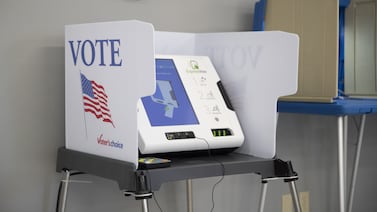A version of this post was originally distributed in Votebeat’s weekly newsletter. Sign up here.
This week we saw in very specific ways how elections are still under attack. Madison Cawthorn, a Republican congressman from North Carolina, spoke at a county political event and predicted “bloodshed” if elections “continue to be rigged” and “continue to be stolen.” Cawthorn, of course, has a history of telling bold lies. This is predictable behavior for him, just as continued lies from the far right about the election have also become predictable.
It is a craven thing: Pushing lies until your base is angry about a problem that doesn’t exist and then, as you crank up the heat, predicting imminent doom when that anger boils over. This rhetoric has already had real consequences. The lies that Cawthorn continues to spread, which are identical to so many others, have led to pointless and restrictive voting laws this year as well as a slew of threats at election workers. The result? An exodus of election workers with experience and technical training that is needed more now than ever.
We’ve known about the problem since the start of the year, when reports of huge numbers of job openings in local election administration began to trickle in. Meanwhile, the conspiracy theories have continued, and the laws passed in the legislatures are making elections more expensive and more difficult — with no accompanying new funding. There is no sign that the retirements and job changes will stop, and the federal government has intervened. This summer, the Department of Justice launched a taskforce to investigate the threats received by election officials. Last week, Attorney General Merrick Garland held a call with more than 1,400 such officials, in which he said the DOJ “will not tolerate threats to, or intimidation of, election officials and election workers.”
Otherwise, the federal government is doing little to address the established and new weaknesses in elections. Politicians and officials have not done enough to dispel the lies that Cawthorn and the like are putting out, offering vague defenses about security and trusted local officials. As evidenced by the For the People Act, lawmakers who attempt to reform voting laws appear to know very little about how elections are run. 2020 was a successful election against all odds, because local election officials worked around the clock opening mountains of envelopes and finessing ancient systems to function.
Democrats in Congress have included no new federal funding in their spending plans to assist these people — people they called heroes and vowed to protect — to do the jobs that have become far more complicated. They have also made no real progress in advancing the For the People Act, and while the John Lewis Voting Rights Advancement Act has now passed the House, its fate in the Senate is less clear.
Then there are “the audits.” In Texas, the Senate quickly passed a new bill this week enabling any state or county party official to call for an audit of a county’s election results. The bill did not get a vote in the House before the end of the special session, however it’s highly possible we’ll see it resurface in the Legislature’s third special session. The battle over conducting such a partisan audit in Pennsylvania continues. In Arizona, where all of this nonsense began, the Senate still hasn’t received its audit report from Cyber Ninjas.
The misinformation and politicking on misinformation hasn’t slowed since the start of the year, like many assumed it would as the natural course of human interest moved toward normalcy. Perhaps it still will, but for now, election administrators are caught in the middle between two parties that have diametrically opposing views on voting and that — as we’ve continually reported — aren’t actively listening to people who actually run the elections themselves.
If you are in a state where your elections have radically changed (and ways good or bad) and you think we should know about it, reach out. We are small, but our mission is to inject good information into this space, not just debunk bad information. We want to show our audience how this process works at a granular level, so that when bad information circulates, good information already exists to combat it. Help us do that.
Back Then
Political parties and the franchise have an odd, intertwined history in America. In some sense, they grew together. Many historians say that political party membership as part of personal identity did not become a defined part of American culture until the 1800s, when the Federalists and the Republican parties turned campaigning into something we’d recognize today. The issue of who could vote for the party they supported, thus, became a natural part of American political discussion. The Federalists opposed widening the franchise — their loyal supporters were Northeastern, wealthier voters. The Whigs, the most elitist of the bunch, agreed. Republicans were more open to the concept, though racism and classism prevented them from favoring full enfranchisement. The Democrats wanted all white people to vote, regardless of property ownership. After the Federalists fell out of favor when the War of 1812 proved to be a right mess, the other parties began to inch in, and expanded the franchise as a means to achieving elected office.
In Other Voting News
- Continuing to put the pressure on voting rights, the Department of Justice has issued guidelines for redistricting in comportment with the Voting Rights Act. “Where jurisdictions don’t draw maps that fairly enable all citizens, regardless of race or membership in a language minority, to elect the candidates of their choice, the Justice Department will act,” an official told reporters in a briefing, reported Roll Call.
- As mentioned above, the Arizona audit has not been released, but many records related to how the whole thing got started now have been. American Oversight, a nonprofit government transparency group, sued the Arizona Senate for the records, and others may be released in the future — the litigation is far from over. Among the most revealing material are text messages from a Trump associate who asked about where to direct a $175,000 donation toward the effort. The documents also show Trump attorney Cleta Mitchell helped create and manage a bank account held under the name American Voting Rights Foundation and used it to funnel at least $1 million from unidentified donors to three subcontractors working under Cyber Ninjas. Also notable: The man the Senate has hired to review Maricopa voters’ signatures on mail-in ballot envelopes is a Trump-supporting conspiracy theorist who claimed unproven vote tampering cost him a 2020 primary race in Massachusetts.
- The drama continues in Mesa County, Colorado, where County Clerk Tina Peters is under state and federal investigation for leaking internal election information. Her deputy, Brenda Knisley, has now turned herself in and has been charged with felony burglary and misdemeanor cybercrimes. She had already been placed on administrative leave and banned from the office but “allegedly entered the Clerk and Recorder’s office on Aug. 25 and tried to use County Clerk Tina Peters’ credentials to print documents.” Meanwhile, local officials and the former secretary of state in Colorado met this week with residents who believe the machines were compromised, but they couldn’t present any actual evidence of the problems they claim plagued the state’s 2020 election.
- Fourteen Republican lawmakers in Pennsylvania are suing over the state’s vote-by-mail law, calling it unconstitutional and asking for it to be overturned. The basis of their lawsuit is that the Pennsylvania Constitution requires the state to let people vote absentee if they cannot physically vote in person, whereas the 2019 vote-by-mail law grants that option to everyone. Eleven of the lawmakers bringing the suit voted in favor of that 2019 law.
- Here’s what county election officials in Georgia are doing to prepare for the many local requirements of the state’s new election law. Stephen Fowler of Georgia Public Broadcasting reported from a mandatory statewide training where these officials learned how to implement and comply with each and every section of the new rules. He writes, “Some parts put more pressure on them, such as tighter windows to mail out absentee ballots, new processes for verifying applications and quicker deadlines to make sure every ballot is counted. There are new responsibilities for supervisors to provide more information about total ballots cast and election processes such as logic and accuracy testing of equipment.” Fowler captures the resilience and anxiety of these administrators in their own voices, perspectives that are all too rare in news reports. “I just want voters to know,” one county official said, “that they need to be patient with all of us, because right now we’re learning about Senate Bill 202, and it’s just going to be quite a process.”
- Maryland will pay $230,000 to settle a lawsuit that the National Federation of the Blind brought against the state, which alleged that the state didn’t accommodate blind voters in accordance with the Americans With Disabilities Act and compromised the secrecy of their ballots. The state’s Board of Elections agreed to enhance poll worker training, to require two electronic voting machines at half of all polling places, and to direct more voters of all abilities to use those machines — which prints out a ballot different in size from the standard hand-marked ballot — to reduce the chance a blind voter’s ballot stands out as identifiable.






